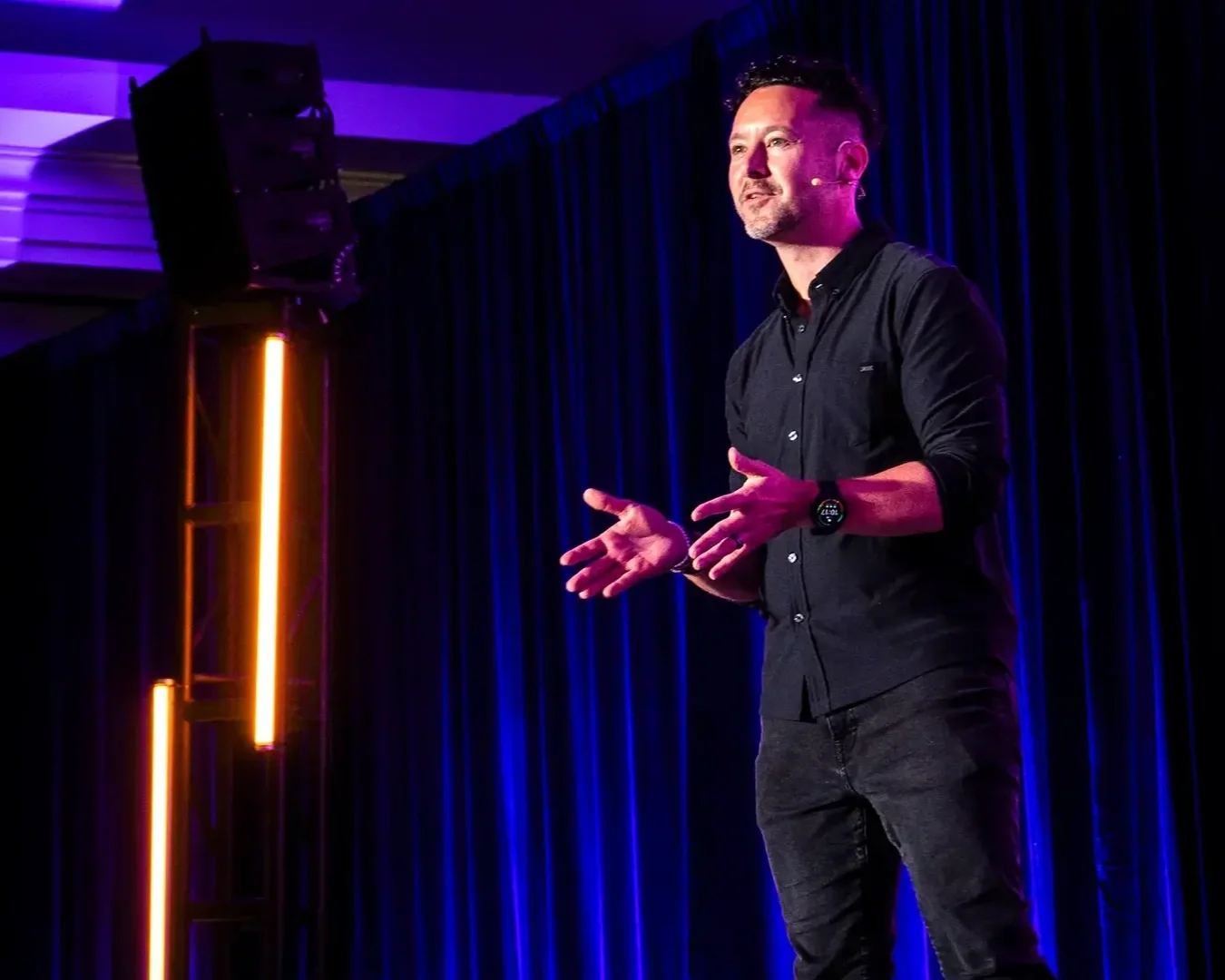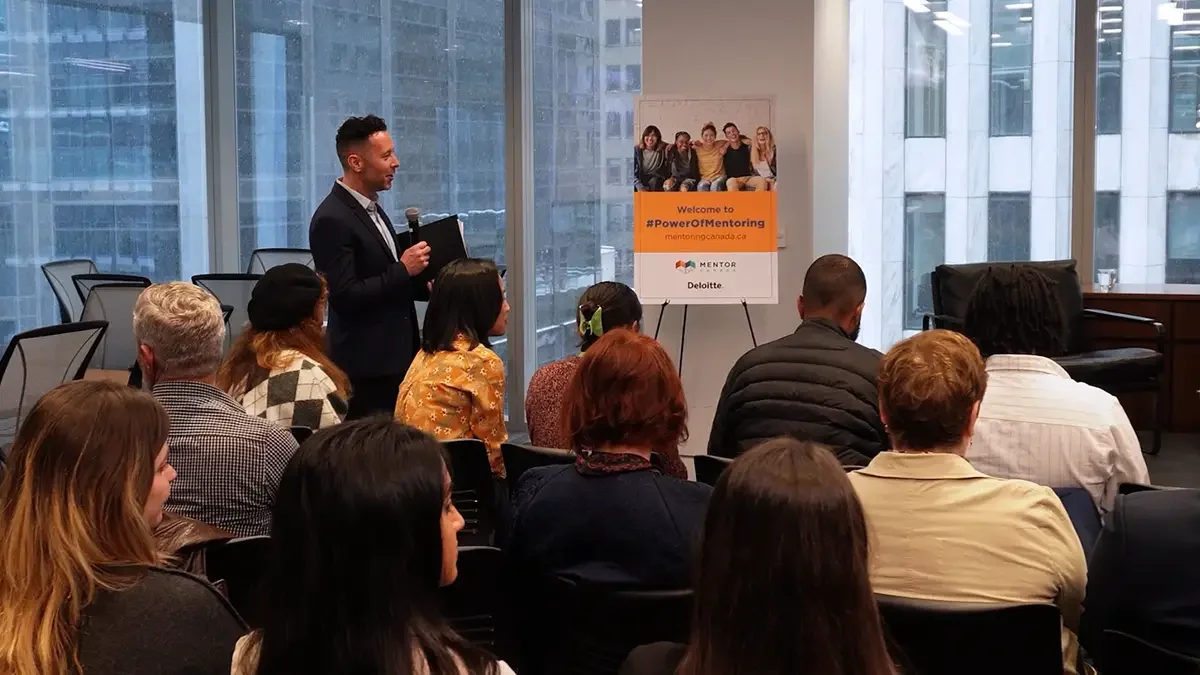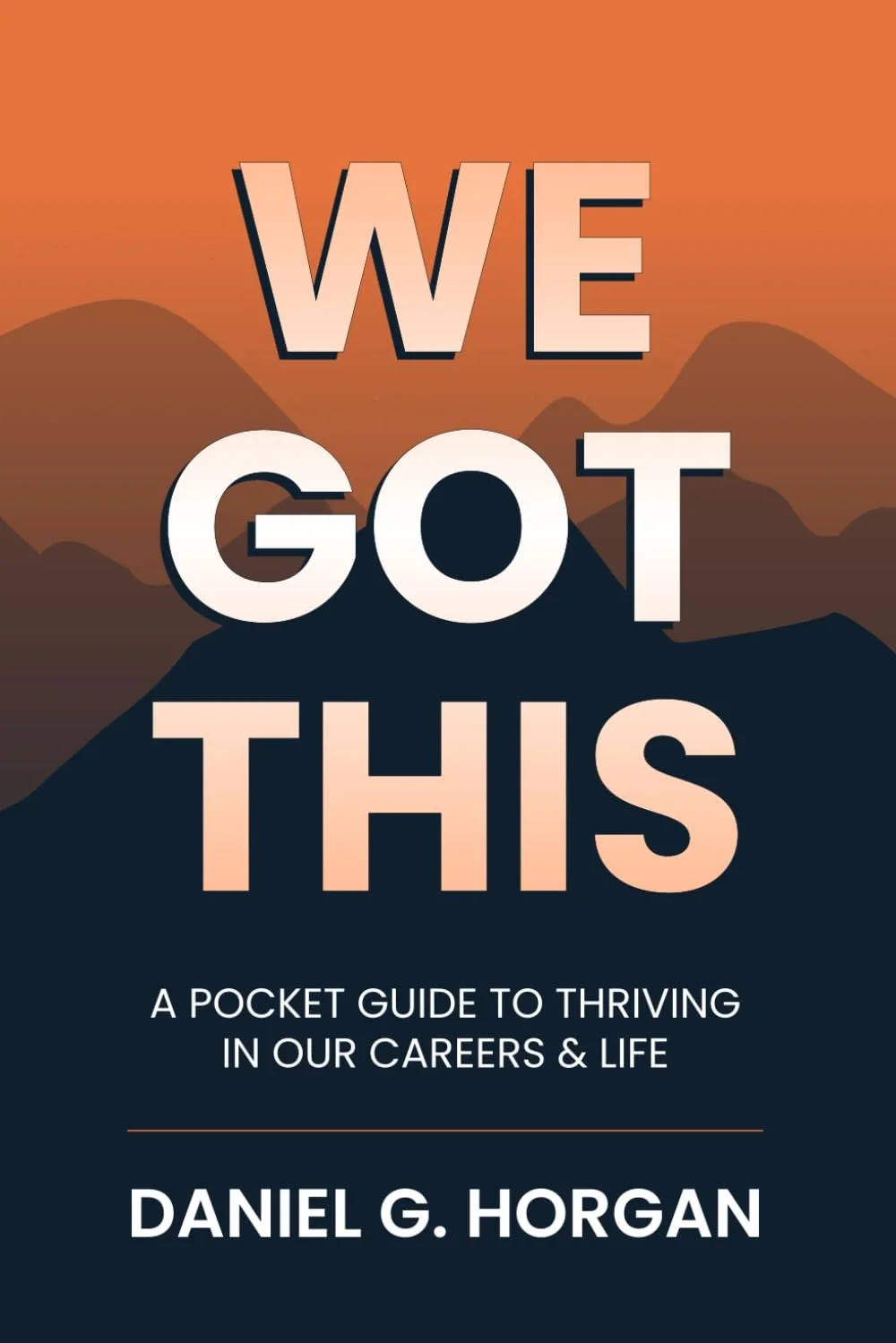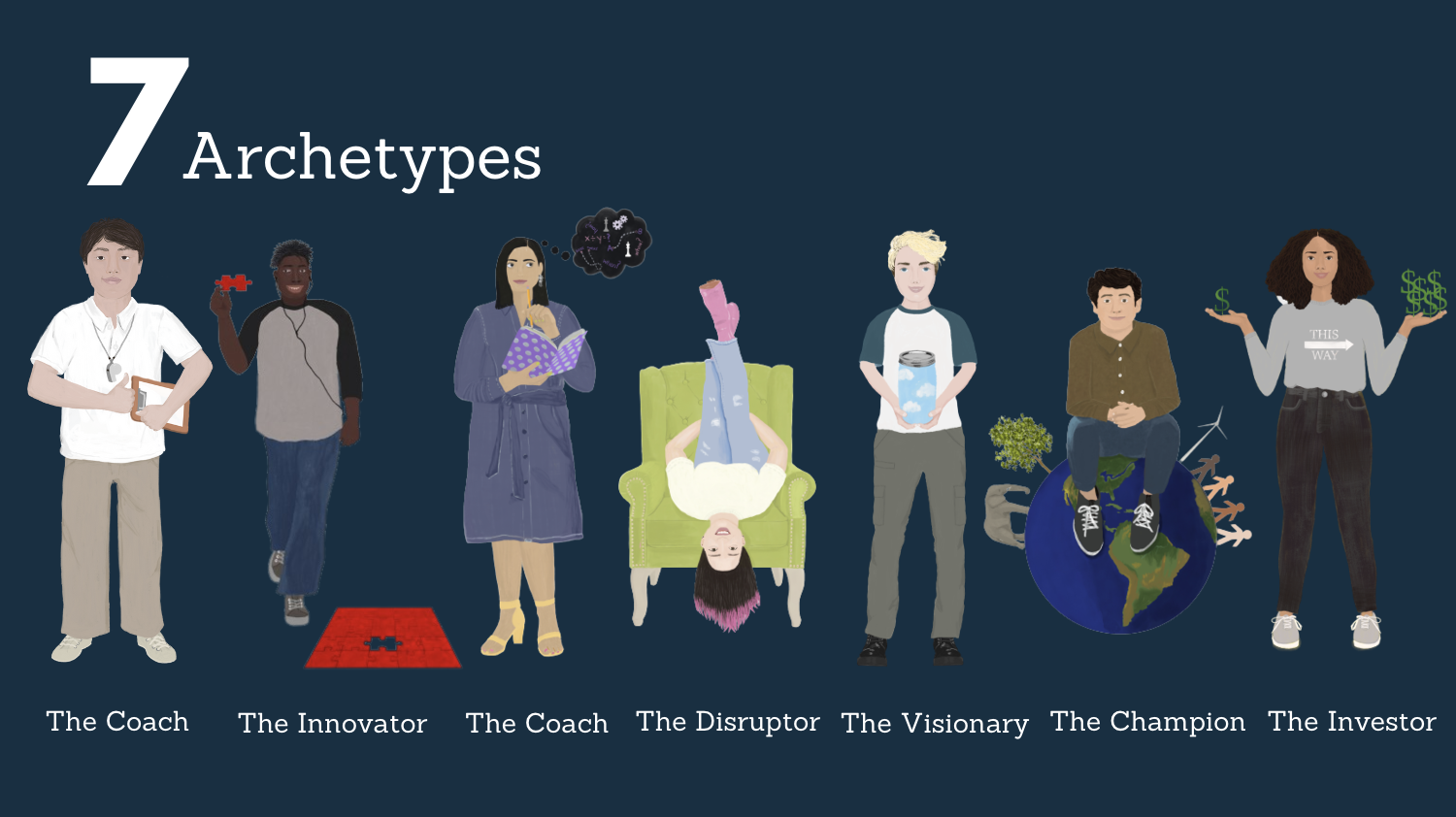Daniel Horgan
has spent more than 25 years working across the business and nonprofit worlds, partnering with brands like Taco Bell, Starbucks, Apple, and LinkedIn. His work has reached thousands of young professionals through mentorship and purpose-driven leadership. Through CoLabL, he partners with early-career talent and people managers to build spaces that expand networks, skills, and experiences. He currently serves on the Taco Bell Foundation Board, and has held board roles with City Year DC, the Community Foundation of the National Capital Region, Team Kids, the Greater Pittsburgh Nonprofit Partnership, and America’s Promise. A Pittsburgh 40 Under 40 honoree, he has facilitated hundreds of training sessions, keynote conferences, and published on Forbes.com. He is the author of Tell Me I Can’t… and I Will and We Got This: A Pocket Guide to Thriving in Our Careers and Life. That idea of building what’s missing, not waiting for permission, is at the heart of this conversation.
At 18 you pioneered the first youth-led effort for America’s Promise Alliance in Pittsburgh under General Colin Powell and even earned recognition from President George W. Bush. Can you take us back to that moment and share how that experience shaped your view of leadership and opportunity?
It's interesting. Back in 1998, I was 18 and a freshman in college. Retired General Colin Powell had just launched America's Promise, which was very much run like a campaign. People were working around the clock, organizing communities around young people and with young people.
Here I was in Pittsburgh as a freshman in college, super passionate about service. I said, well, I can organize my peers. I can get college students and high school students around the table. We'd look in our communities using creative methods - I used to give people disposable cameras with 24 pictures and challenge them to take 12 pictures of things they liked and 12 of things they didn't. Then we'd bring the pictures together and ask: what can we do to elevate the strengths of our community while closing some of the gaps?
I didn't know it at the time, but we were the only youth-led community mobilizing mostly young people. When I went to ask for funding from adults in the community, most people would say no, or ask why I didn't find someone to mentor me to do this work. Which honestly just fueled me more. My first book was Tell Me I Can't and I Will because when you tell me I can't do something, I'm going to feel more compelled to do it because I want to prove that I'm capable.
Long story short, the national office picked up the work we were doing. I ended up joining the board, served for seven years, and launched something called the Youth Partnership Team - a group of 24 young people who advised the national office. I learned quickly that the power I had was my youth voice and keeping it at the center of decision making. Proud to say that 20 some years later, that Youth Partnership Team is still up and running.
CoLabL is really unique in that it brings corporate, nonprofit, and educational worlds together under one roof. When you were just starting out, what made your approach different from other consulting firms or nonprofits?
My early community organizing efforts were always rooted in this philosophy of "nothing for them without them" and that's never changed in all of my work.
I always feel like if you are making decisions, designing programs, running experiences for a target audience, you have to co-create it, co-design it with them, or you risk not being relevant and not fulfilling the full potential of whatever it is that you're creating.
In the early days, I was hosting listening sessions, bringing parents and teachers and young people together into the same rooms. Oftentimes that wasn't the norm - go talk to the kids over here, go talk to the parents over here. It's like, no, just bring the community together.
I'll give you a quick example: I was working in what used to be the third largest city in Pennsylvania, 40 minutes outside Pittsburgh. When the steel mills closed in the 1980s, that community lost its economic base and became very poor. We started doing listening sessions to understand what we could do to bring new energy into this community.
We engaged people in their 80s and 90s in intergenerational experiences where they brought out memorabilia from when they worked the steel mills. They showed beautiful pictures of street festivals and potlucks where people would close down streets and have amazing meals after working their shifts. When the kids saw it, they were like, well, why don't we do that anymore?
And the very first question I always ask was: I don't know, why don't you do it? You have people in this community, people can cook, you have tables - all those things can happen again. We ended up doing it. We worked with the young people in that community to bring it back and actually get the stories from these elders. The elders had this renewed sense of hope because instead of looking at kids as a problem, they were starting to see them as neighbors.
I also took kids on bus trips to different communities and showed them places that looked very different from where they were. They'd start asking questions like, why isn't there trash on people's streets here? Why don't people's houses look so nice like in my community? And again, you ask the question, why not? You can make those things happen. Those young people would come back and we'd organize community cleanups, projects to renovate different nonprofit community spaces.
All of that starts in the mind. If you show someone what's possible and you fuel it with hope, you can create whatever change you're hoping to achieve. All through my career, no matter whether I'm in corporate, nonprofit, or education, you take that same philosophy and apply it. Teachers can do that with students, people managers can do that with their teams in corporate settings, nonprofit execs can do that in their organizations too.
What assumptions did you let go of?
I think sometimes the biggest assumption was that at some point you start to believe that you are not capable of creating the change that you're trying to create. That assumption comes in what people talk about today as doubt or imposter syndrome. The assumption is: I might not be good enough to make this happen.
But the people who try and the people who learn - one of the very first community projects I did when I was a sophomore in high school, I wanted to organize a craft fair where all proceeds went to local charities. My first craft fair was a complete failure. I had an entire cafeteria full of crafters that brought all this setup and product, and we probably had like 20 people come. People were mad that they had spent their day and time.
But then I worked with those people to say, well, what would draw the crowd in and what would make you excited as a crafter to want to come back? I went to advisors at the school and said I want to try it again, but I want a redo on the things that I missed this time around.
That to me is the core takeaway: if something you try doesn't work, regroup, reset, and try it again with the new knowledge that you've gained from that previous experience. Far too often we give up too quickly and we don't see it through. When we try it again, we often surprise ourselves and those people around us too.
Lightning Round!
Go-to Taco Bell order: Churros.
Song that instantly puts you in a good mood: Anything Bad Bunny.
Favorite online trend or meme: I’ve been intentional about curating my feed to align with my goals, following topics and people that support what I’m trying to learn or do instead of doom-scrolling.
Most underrated app on your phone: My Sudoku or mind-games app
Favorite hashtag that best describes you or your work: #WeGotThis, also the name of my book, is a reminder that we’re stronger together.
Dream collaboration or brand partnership: Costco
Book that’s influenced you most (outside your own): Atomic Habits by James Clear, the idea of getting 1 % better day after day and the compound effect of that over time.
You’re a published author yourself, and your recent book We Got This: A Pocket Guide to Thriving in Our Careers & Life released in January 2025. What was the signal or question that told you it was time to write this book?
That book is essentially a compilation of all the things that I cover in coaching sessions, workshops, or one-on-one discussions. I wanted to be able to scale it and make sure I'm capturing all those things that I'm learning. I've always been somebody who, if I learn something, I want to give it. I want to make sure other people have access to it. If I can equip somebody with that information sooner than when I got it, it helps maybe somebody get onto a different path or make a different choice.
A very funny story though: I went to write that book two years ago and I wasn't disciplined with my time and kept delaying the act of writing it. Last year I was intentional with planning a writing retreat and booked five days to do nothing but write that book. I noticed on day one it was the 10th anniversary - 10 years prior on the very same day that I published my first book. And I did not even know that.
I'm a huge believer that the universe guides us. In that moment, the universe was putting me right where I needed to be doing exactly what I was doing.
You’ve helped young leaders grow through every stage. Looking back, what’s the one message you’d want every young person to remember?
It's sort of a two-parter: keep moving and keep learning. It's rooted in this philosophy that a lot of people come to me and say they're feeling stuck, lost, not sure where they're going next. Our inclination is sometimes to stay where we are until we can figure it out. What I always say is: if you're feeling stuck, take an action, take a move, take some movement, and you'll get unstuck through that action.
The other part is if you keep learning, you're feeding your curiosity and that knowledge base that will help you figure out the next step. Keep learning means keep your mind open to new ideas, new perspectives, challenging your own assumptions. Those two things combined take people really far.
Our book has seven leadership archetypes — the visionary, innovator, disruptor, investor, strategist, champion, and creator. Which one best fits you and why?
I'm a combination of three: the visionary, the creator, and the champion. One of the things that I've learned is important is the ability to think big, but actualize. I can come up with big ideas, but I'm also grounded enough to say that big idea has to have an action plan and systems that support implementation, or it just remains an idea. That's where the creator concept comes in - okay, big idea, now how do we make it happen?
The champion is acknowledging that I am not going to do this on my own and that there's lots of people fueling my motivation and discipline. I want to champion other people. It's often what I do on social - instead of talking about my work, I champion the people around me that are doing great things that remind me that when we all contribute the best of ourselves to the world, the world becomes better. Who doesn't want a better world?
What is a failure or setback that taught you something essential about how to lead and grow?
When I first launched my business, I probably did a hundred informational interviews with entrepreneurs at different stages of success. One thing that was interesting: 50% said I had to double down and build my own personal brand. The other 50% said you have to have a really solid, complex business plan fully mapped out.
To be honest, neither one felt exciting to me. But I skewed toward building my personal brand. I launched my business as DG Horgan Group using my name. I got contracts and made profit, but it never felt authentic. Two and a half years in, I decided to rebrand to CoLabL. As soon as I did that, it was like this freedom came over me to be able to really sell the work we were trying to do, the change we were trying to create - not me selling me.
That was a lesson: everyone's going to have an opinion, everyone's going to tell you what's worked for them. You have to take that data in and marry it with your own context. Align it to your own core values. As soon as I gave myself permission to do that, I started to accelerate the business and the change we were trying to create.
The lesson is: be true to yourself, listen to other people, be curious about their journeys and experiences, but in your gut, follow the thing that instinctively feels right for you. It usually doesn't steer you wrong.
I'm a huge Jay Shetty fan, and he did this conversation recently where he said when you think about your gut, a lot of times people dismiss it because they think it's just pulling an answer out of the air. But the reality is your gut is a combination of your experiences. It's the knowledge you've gained over the years. When you listen to your gut, you're listening to your experience, the knowledge, the people that have poured into you. That's what's ultimately giving you, in most cases, an authentic answer.
What about a time when you faced rejection?
When I launched the America's Promise effort in Pittsburgh, it took me like a year and a half to get any foundation or company to sponsor the work. I was just super resourceful in saying I believe in this work and I found creative workarounds.
An example: every university had financial aid money allocated for college students who worked in the community. I just leveraged a channel that was already sitting in my university but not being utilized to cover the cost of stipends. When foundations said no or companies wouldn't sponsor us, you keep looking, you keep digging to find there is a way.
A good friend of mine always tells me: if you want something bad enough, you're going to find a way. If not, you'll find an excuse.
If you really are motivated to get from point A to point B, you'll figure it out. It might take a little time, but sometimes in that effort you find something super innovative that other people can learn from.
You juggle being a published author, speaker, CEO, and board member. What is one small habit that keeps you grounded and connected to your why?
Definitely staying true to my values. I'm a very values-aligned person, so if I take on a new project, it's like: how does this align to the values that are important to me? The values of lifting others, creating change where I think it needs to be created, encouraging people. I use that as a filter.
Making sure you build in reset moments is important. Especially when you're juggling a lot, find reset moments during breaks to zoom out and ask yourself: here's everything I'm doing right now with my time - how do all these things align to some of the goals I'm trying to achieve in life, the networks I'm building, the relationships that are important to me?
You'll notice sometimes that there's things that don't really align and being okay with saying I'm going to remove that, take that off the plate so I have more time over here. Those types of resets are so important and oftentimes forgotten.
You’ve worked with so many young people across programs and companies. What should our generation know about mobilizing our peers around a cause — not just getting them interested but keeping them engaged?
It goes back to something we talked about earlier: the importance of staying curious and then taking action. It's matching curiosity with an action plan.
Think about entrepreneurs who see something in the world and ask why it doesn't exist, then go create it. That's the advice I would give people: be curious with your day to day, look around you and ask yourself how can I make life better for people around me, including myself? Then what actions can I take to do that?
Sometimes it's going to be starting a business and creating a product or service. Other times it's honestly going to be the smile that you put on your face, the kindness that you show to someone that you're engaging with that does have that ripple effect over time.
What's one invitation you'd make for someone listening who wants to get into that growth mindset, into connections and working and improving their lives?
I'm always open to connecting with people or sharing what I'm learning through my books or just through one-on-one connections. So I put that invitation out there.
The other invitation: sometimes it's okay and needed to unlearn things that are not serving us where we are in our lives. We all navigate different seasons, different chapters, different experiences, and we learn things to help us get by, to get through those moments and be successful. But as we progress, as we evolve, there are certain things we've learned, certain habits we've developed, certain practices we put into place that don't serve us well.
When you do that reset, I think it's so important to say: I need to leave that behind and create a new practice that's going to serve where I go next. That would be my final piece of advice - an invitation to unlearn the things that are not serving you today.
Takeaways
If you can’t find the love, create it.
“Nothing for them without them:” co-creation is key.
Regroup, reset, and try again. Every failure is data.
Stay curious and keep learning.
Define success on your own terms, anchored in values and people.






